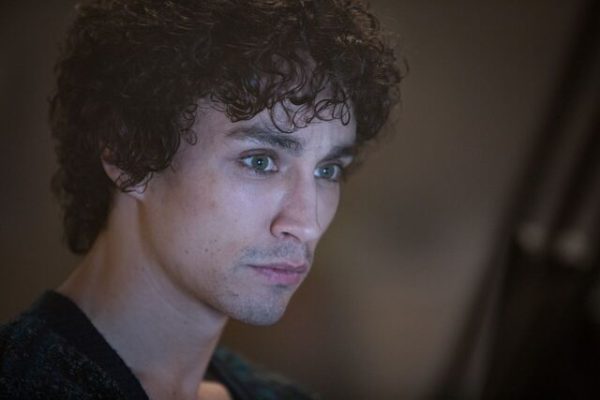Martin Carr chats with Bad Samaritan director Dean Devlin…
Holed up in a local bar opposite Cowes yacht basin and looking out at glorious sunshine I find myself Transatlantic with Dean Devlin. Producer, writer, director and independent filmmaker of blockbuster tent poles including Independence Day, Stargate, Godzilla and The Patriot. With his latest directorial effort Bad Samaritan, we find him out of that comfort zone, deep in thriller territory and taking a certain Doctor along for the ride.
First we discussed what drew him to that material. From his slightly colder New York locale he discussed how Brandon Boyce, screenwriter for Apt Pupil, had come to him with the finished script looking for a second opinion. Having been friends for years Dean was only asked for his thoughts never thinking that the material might appeal. Having finished the piece he told me how he felt excited to the point of signing on to direct immediately. By his own admission the subject matter was like nothing he had done previously, but as with everything it was the story that had him hooked.
Knowing Dean primarily from his work as a producer I asked how his directing style differed in comparison. As he discussed this at length it became apparent that the defined roles of producer and director did not really apply to him. His working relationship with Roland Emmerich and the independent nature of his approach, meant Dean had more creative input than normal. For this reason his directing style us defined and reliant on good story telling. His focus therefore was always about making this the best story it could be through an openness and creative inclusion with all his actors.
Leading me to ask him how he balanced the differing genre requirements of Bad Samaritan. Dean was very clear that his lack of comfort with this subject matter meant a delicate approach was needed. On more than one occasion I stated how it felt like we were going into Eli Roth territory, while Dean made it very clear of their intentions in his answers. From the off certain elements which might be considered disturbing were never intended to be sexualised. This area more than anything needed carefully structured consideration and Dean said he felt his team had struck the right balance. Villainous intentions here were never about any sense of physical gratification, but rather concerned with the retention of power.
Considering the complexities of this single evil force my next question was simply why did he pick David Tennant?
Dean not only revealed our shared love of Doctor Who but why he considers David Tennant so completely underrated. Name checking his work on BBC drama Broadchurch then jumping ahead to recall Kilgrave from Netflix’s Jessica Jones. Dean explained how being independent from the constraints of studios meant he could choose who he wanted. There was no pressure being applied to cast the latest celebrity made famous on social media sites. He talked at length about how kind, professional and considerate David Tennant was to work with, but went further by explaining his method. Unlike many actors he is able to switch the character off once scenes are complete. However when those cameras were rolling Dean was genuinely in awe of what David put into the performance.
During the interview I also shared my thoughts on David Tennant, as I felt few actors would have been able to give this character any sense of empathy for audiences. When I asked Dean whether he had any reservations about the darker elements he once more lauded his leading actor’s ability to communicate those fixations with care and consideration through performance. Engaging as David Tennant does so completely and yet to emerge unscathed and unjudged by an audience took great skill.
Next we deviated onto the topic of Robert Sheehan who plays Dean’s central protagonist. He commented on Robert’s emotional vulnerability and said few actors would allow themselves to go to those places on-screen. I mentioned how Robert Sheehan added a naturalism which worked well opposite David Tennant’s intensity, before Dean said that he thought Robert Sheehan was one of the best young actors working today.
I then broached the subject of other directors and more specifically what qualities made a good feature film director for him. Above all he stressed an ability to tell a story and control vast groups of people towards one aim. There are literally armies of people that are involved in making a feature film. Being the director of anything requires fortitude, a thick skin and passion for your vision, which roughly translates into not letting people interfere. Which also implies a need for independence from studios where possible, that in turn allows for artistic freedom.
Having established where Dean stood on the process itself, we circled back around to the question of nature or nurture. Did he think that characters like David Tennant’s Cale Erendreich were borne or raised?
As it turned out Dean felt the same as myself believing that both types of people exist in this world. Some are a product of environment while others are simply borne with compulsions built in. As our conversation was drawing to a close I let the fan boy in me out for a moment and asked Dean if he could tell me anything about Independence Day 3?
Unfortunately he has no involvement in any further instalments of this franchise and was unable to comment. Dean politely said his role came to a close with the sequel but wished anyone else the best of luck.
Bad Samaritan is released on May 2nd 2018. Read our review here.
Many thanks to Dean Devlin for taking the time for this interview.
Martin Carr
Photo Credit: Courtesy of Electric Entertainment














